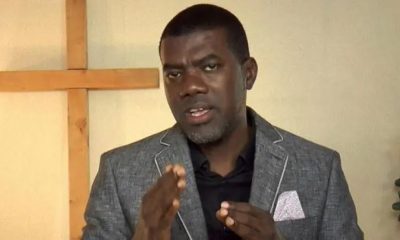Education
We’ll suspend strike if FG meets our minimum demands – ASUU

The Academic Staff Union of Universities says it will suspend its prolonged strike if the Federal Government meets its minimum demands.
President of ASUU, Prof. Emmanuel Osodeke, stated this on Thursday during a national town-hall meeting on tertiary education.
The forum was held with a theme ‘The Locked Gates of our Citadels – A National Emergency’.
ASUU has been on strike since February 14 over the government’s failure to meet its demands, such as funding of universities and lecturers’ salaries and allowances.
The Federal Government recently filed a suit against the union at the National Industrial Court over the strike.
Speaking during the town-hall meeting, the ASUU president said the suit would worsen the situation, adding that the union was ready to engage with the Federal Government.
“On all these issues, we have given the government a minimum that we can accept, but they have not responded on issue of revitalisation, earned allowance and on other issues that we have all discussed,” NAN quoted Osodeke as saying.
“We negotiated and agreed that they should sign. This is very simple and it will not take more than one day.
“On UTAS and IPPIS , we say ‘release the report of the test you did, let’s look at the one who came first, and take it as we agreed’.
“So, we have given them the minimum we want and we have to come down, and they can do it in one day if there is a will.
“If the government loves this country, these children, and their parents, then they should come to the table and let us resolve these issues in one day.
“Just as we did in 2014, they should come and ensure that we do that. We can even have the meeting openly so that Nigerians will see what we are discussing.”
On her part, Vivian Bello, convener of Save Public Education Campaign, a non-governmental organisation (NGO), appealed to the FG and ASUU to resolve the situation, adding that it is the students who are bearing the negative impact of the strike.
Education
Reasons Behind UniAbuja’s Expulsion of 28 Students, Withdrawal of 15 Certificates

Reasons Behind UniAbuja’s Expulsion of 28 Students, Withdrawal of 15 Certificates
The University of Abuja (UniAbuja), now renamed Yakubu Gowon University, has expelled 28 students and revoked certificates of 15 graduates following findings of serious academic and disciplinary violations.
The decision was made at the 191st Regular Meeting of the University Senate held on Thursday, January 28, 2026, after reviewing reports and recommendations from the Student Disciplinary Committee (SDC).
Reasons for Expulsion and Certificate Withdrawal
According to a statement signed by Dr. Habib Yakoob, Acting Director of Information and University Relations, the students were found guilty of offences including threats to life, physical assault, examination malpractice, conspiracy, burglary, theft, cult-related activities, possession and use of hard drugs, and falsification of O’Level results submitted during admission. Some students also failed to appear before the committee despite repeated invitations.
The 15 graduates had their certificates withdrawn for similar non-compliance, rendering their credentials null and void. Meanwhile, nine students were cleared after investigations, and 33 others received formal warnings for infractions including conspiracy, hostel racketeering, and fighting.
READ ALSO:
- Yoruba Muslim Group Dismisses Viral Ramadan Date Claim, Reaffirms Sultan of Sokoto’s Authority
- FCT Council polls: APC Wins Four Chairmanship Seats as PDP Takes Gwagwalada
- Dangote Opens Refinery Investment to Nigerians With Public Share Sale Plans
University’s Commitment to Discipline
The Vice-Chancellor and Chairman of Senate, Professor Hakeem Babatunde Fawehinmi, reaffirmed the university’s dedication to maintaining a safe, disciplined, and conducive learning environment. He emphasised that academic integrity is a core principle and that violations would be sanctioned without compromise.
Professor Fawehinmi praised the SDC for its thorough and diligent handling of cases and urged students to conduct themselves responsibly to safeguard their academic futures. He also highlighted ongoing university initiatives, including student engagement, counselling, and orientation programmes, aimed at preventing misconduct and promoting responsible citizenship and academic excellence.
The university described the actions as part of a zero-tolerance approach to misconduct, reinforcing its commitment to upholding high moral and academic standards on campus.
Reasons Behind UniAbuja’s Expulsion of 28 Students, Withdrawal of 15 Certificates
Education
UTME: JAMB Clarifies Position on Hijab During Biometric Capture

UTME: JAMB Clarifies Position on Hijab During Biometric Capture
The Joint Admissions and Matriculation Board (JAMB) has clarified that candidates are not required to remove their hijab during the Unified Tertiary Matriculation Examination (UTME) registration process.
The examination body issued the clarification following the circulation of a viral video alleging that a Muslim candidate was compelled to remove her hijab before capturing her biometric photograph at a registration centre.
In a statement addressing the controversy, JAMB dismissed claims of a policy prohibiting the use of hijab, describing such reports as misleading. The board reiterated that it respects candidates’ religious rights and does not mandate the removal of religious head coverings during registration.
READ ALSO:
- ₦13.7bn Payroll Fraud Claim Pits Audit Firm Against Osun Government
- Breaking: INEC Declares APC’s Joshua Ishaku Winner of Bwari Chairmanship Election
- FCT Poll: APC’s Maikalangu Wins AMAC Chairmanship as Collation Continues
However, JAMB explained that during biometric data capture, candidates may be asked to adjust their head coverings slightly to ensure that key facial features are visible for proper identification. According to the board, this requirement is strictly for technical purposes and aligns with standard identification procedures used in official documentation processes.
The board emphasized that the adjustment does not equate to a ban on hijabs, noting that clear visibility of facial features is necessary to meet biometric verification standards and prevent identity-related issues.
JAMB urged the public to disregard misinformation and advised candidates and parents to seek clarification through official communication channels to avoid unnecessary panic.
The clarification comes amid growing public interest in ensuring that examination procedures remain inclusive while maintaining the integrity of the registration and identification process.
UTME: JAMB Clarifies Position on Hijab During Biometric Capture
Education
Ogun Gov Rewards Nigeria’s Best Primary School Teacher with Car, Bungalow

Ogun Gov Rewards Nigeria’s Best Primary School Teacher with Car, Bungalow

Ogun Gov Rewards Nigeria’s Best Primary School Teacher Solanke Francis Taiwo with Car and Bungalow
The Ogun State Governor, Dapo Abiodun, has honoured Mr Solanke Francis Taiwo, a primary school teacher at Ansa‑Ur‑Deen Main School I, Kemta Lawa, Abeokuta, with a brand new car and a two‑bedroom bungalow in recognition of his achievement as Nigeria’s Overall Best Primary School Teacher for the 2025/2026 academic year.
The presentation took place at the Governor’s Office in Oke‑Mosan, Abeokuta, with the Commissioner for Education, Science and Technology, Prof Abayomi Arigbagbu, and the ministry’s Permanent Secretary, Mr Oloko, in attendance. The gifts were part of a broader effort to motivate teachers, reward professional excellence, and highlight the state’s education reforms.
Speaking at the event, Prof Arigbagbu said the award demonstrates the effectiveness of the Ogun State Education Revitalisation Agenda, which is built on six pillars including curriculum enhancement, school administration, innovation, infrastructure, funding, and teachers’ welfare. “When you do things consistently and efficiently, you record results. This same teacher won the Ogun State Best Teacher Award in October before clinching the national award in Abuja. This confirms that our education sector has been truly revitalised,” he said.
READ ALSO:
- Police Bust Gang Armoury, Arrest Two Suspects in Delta
- Peter Obi Launches ‘Village Boys Movement’ to Rival Tinubu’s City Boys Ahead of 2027
- Woman Dies in Bandits’ Camp After Family Pays ₦25 Million Ransom

Ogun Gov Rewards Nigeria’s Best Primary School Teacher Solanke Francis Taiwo with Car and Bungalow
He highlighted the state’s successes in national competitions, including the JETS contests, where Ogun students won 18 out of 24 awards in one year, with a single student claiming nine prizes. The commissioner also noted that Ogun’s Technical and Vocational Education and Training (TVET) model and education digitisation initiatives have attracted attention from other states and received commendation from the Federal Government and the National Board for Technical Education.
Governor Abiodun reaffirmed his commitment to teacher development, pledging continuous support through workshops, seminars, digital learning platforms, and AI-powered instructional tools. He said the gifts of a car and bungalow are intended to inspire other educators to strive for excellence and innovation in their teaching.
In his remarks, Mr Solanke expressed gratitude to the governor and the education ministry for fostering an enabling environment for teaching and learning. He vowed to continue improving student learning outcomes and collaborating with colleagues to ensure that Ogun State remains a leader in education excellence.
“I feel fulfilled and honoured. I will continue to give my best and encourage fellow teachers to remain dedicated to nurturing the potential of every student,” he said.
The recognition of Mr Solanke reflects Ogun State’s strategic investment in education, commitment to teacher welfare, and the effectiveness of policies that have positioned the state as a model for academic excellence in Nigeria.
Ogun Gov Rewards Nigeria’s Best Primary School Teacher with Car, Bungalow
-

 Business14 hours ago
Business14 hours agoDangote Opens Refinery Investment to Nigerians With Public Share Sale Plans
-

 Politics2 days ago
Politics2 days agoPeter Obi Launches ‘Village Boys Movement’ to Rival Tinubu’s City Boys Ahead of 2027
-

 Education1 day ago
Education1 day agoUTME: JAMB Clarifies Position on Hijab During Biometric Capture
-

 News3 days ago
News3 days agoPolice to Arrest TikToker Mirabel After She Recants False Rape Claim
-

 International3 days ago
International3 days agoEpstein, Ex-Israeli PM Named in Alleged Profiteering From Boko Haram Crisis
-

 Politics8 hours ago
Politics8 hours agoTinubu Hails Wike as APC Dominates 2026 FCT Area Council Elections
-

 Education2 days ago
Education2 days agoOgun Gov Rewards Nigeria’s Best Primary School Teacher with Car, Bungalow
-

 Entertainment2 days ago
Entertainment2 days agoTacha Condemns False Rape Allegations After Mirabel Admits Fabrication













